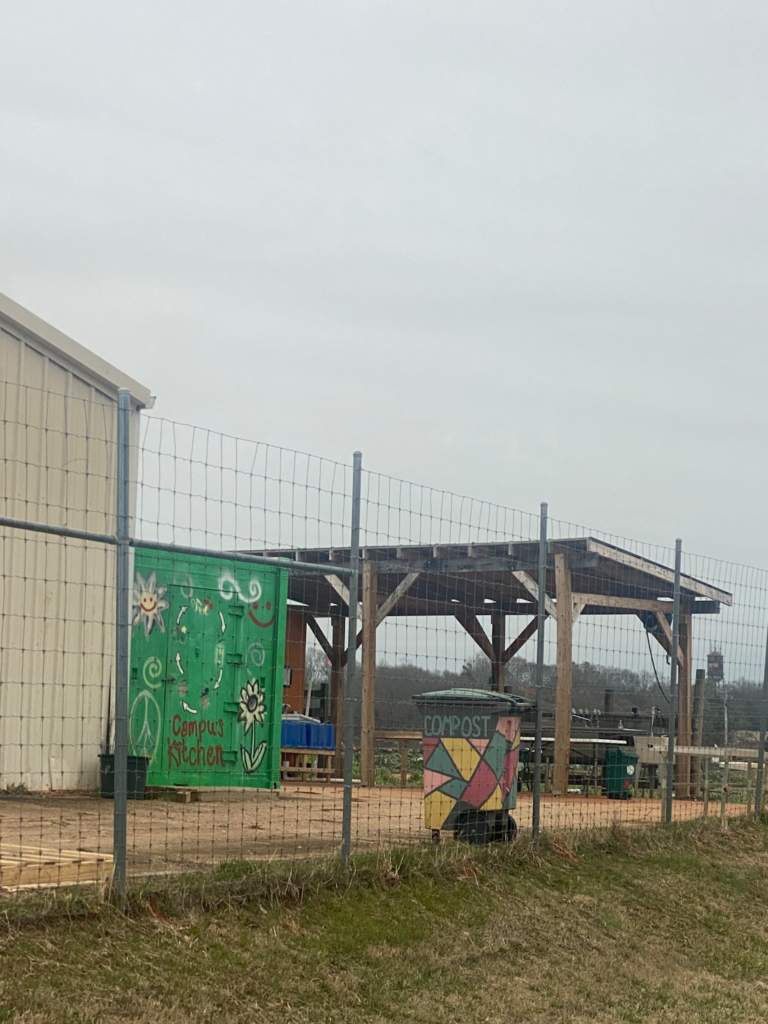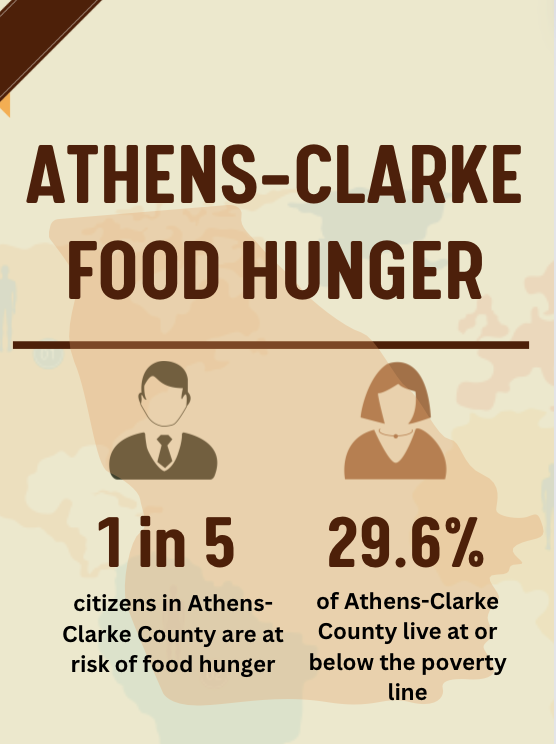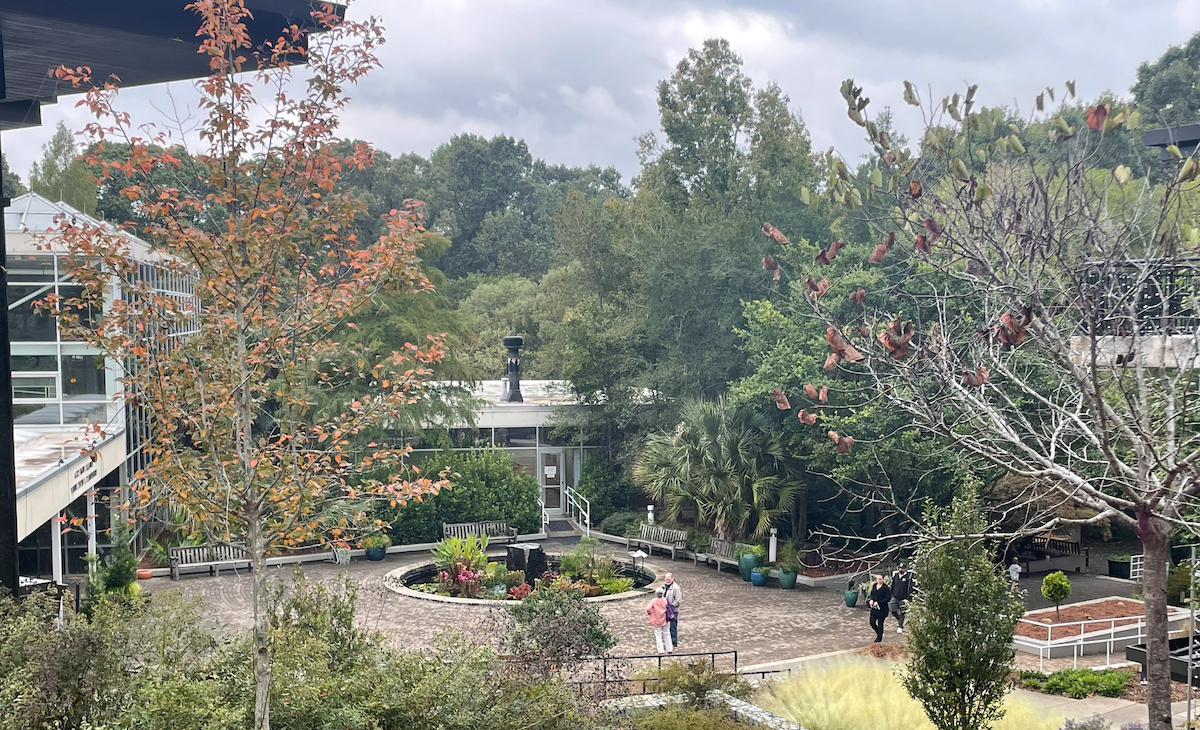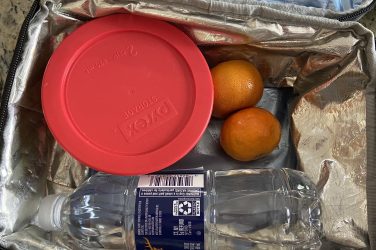
Athens-Clarke County is $12 million below the money required to meet food needs, with Georgia ranked ninth in the nation for senior citizen food insecurity.
As Athens-Clarke County food insecurity among citizens continues to grow, the University of Georgia’s Campus Kitchen addresses the growing needs of those in the community while committing to fostering sustainable practices.
Food insecurity, which is when a household does not have enough money or resources to buy the food they need, has become a prominent issue in Athens-Clarke County. Based on 2022 U.S. Census reports, 29.6% of Athens’ citizens are at or below the poverty line, meaning numerous citizens are facing the inflated costs of necessities.

“They’re experiencing food insecurity for a variety of reasons,” said Andie Bisgelia, the program coordinator for the Campus Kitchen. “It could be that they are no longer able to drive, can’t cook, or they might have an income that doesn’t allow them to get as much nutritious food as they need.”
UGA’s Campus Kitchen hunger-relief program receives grants from nonprofits and the government and food donations from grocery stores like Trader Joe’s and Earthfare to make meals and deliver groceries to human service agencies in the community.
The Role of Campus Kitchen in Addressing Community Needs
Campus Kitchen partners with organizations like the Athens Community Council on Aging (ACCA), a service organization that supports the needs of senior adults in Athens. Currently, Campus Kitchen makes homestyle meals for 55 families referred to by the agency.
The ACCA is a beneficiary of Campus Kitchen for many programs, like the Turkey Palooza and Meals on Wheels, which both cater to senior-led households who suffer from barriers like income, transportation and physical disabilities.
With the demand for food being higher than the supply, Campus Kitchen can support when needed. For instance, with the Meals on Wheels program and how the funding is processed, some households can only be active clients for a maximum of a year. But if a household is no longer a client with ACCA, the organization will contact Campus Kitchen, which will then, in turn, be able to serve the former client with weekly deliveries.
“So we work with Campus Kitchen year round. Turkey Palooza is like the big annual thing, but every week the campus kitchen does their deliveries to clients all over. They do weekly deliveries of prepped meals that they just have to heat up and also usually some grocery items,” says Leslie Trier, director of programs and services at ACCA.
They’ve been a huge, huge partner — they serve much more than just us, but they’re one of the best partners we have,” she said.
Combating Food Waste
Campus Kitchen’s focus on food sustainability response to local food insecurity is marked by its commitment to meeting immediate needs and its dedication to fostering sustainable practices in food production and distribution.
According to the Environmental Protection Division, “Food waste accounts for over 12%, equating to 800,000 tons annually, of the waste deposited to Georgia landfills.” Waste contributes to pollution of air, water and soil which can lead to harmful chemicals and greenhouse gasses being released into the environment. Waste must be reduced in order to lessen climate change and ecosystem degradation.
Approach to Food Waste and Environmental Conservation
The first step that Campus Kitchen takes in terms of sustainability is the reclamation of food from restaurants and grocery stores that would otherwise be wasted if not donated. They then provide meals and groceries to those in the community. In some cases, there might be produce and grocery items left over. Campus Kitchen acknowledges that everything is not usable to create meals; thus, they ensure that everything unusable becomes compost.
“[We’re] based at UGarden — an organic run farm. So they’re following very ecological practices in what they’re doing from applying compost to the fields to cover cropping,” said Bisgelia.
Composting food benefits the environment by enriching the soil and ensuring that the food is still being used in a beneficial yet sustainable way.
“We cook, like, nutritious meals that have, like, vegetables, proteins, starches. So that’s a huge part of how we’re sustainable, but, also we’re composting, so it’s going back into the soil. And that’s better than it just ending up in landfills where, like, it’s in an anaerobic environment,” said volunteer Alex Ruano, who started volunteering at Campus Kitchen in 2022.
With the volunteer opportunities within Campus Kitchen at UGA and the surrounding ACC community, there are a plethora of volunteers. The enrollment continues to stay high, as over the entire 2023 calendar year, the program has had approximately 1,200 volunteers, according to Bisgelia.
Currently, the Campus Kitchen has made 19,835 meals from scratch, delivered 4,952 grocery bags to senior-led families, and looks to revolutionize sustainable food practices and continue to diminish food insecurity.
Kacie Geter is a senior majoring in journalism with a minor in fashion merchandising at the University of Georgia.








Show Comments (0)